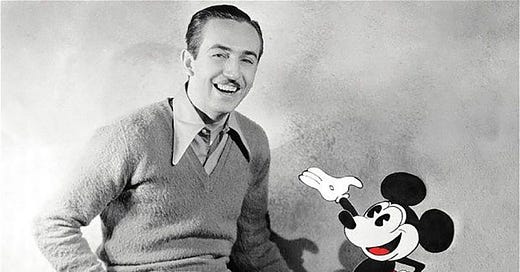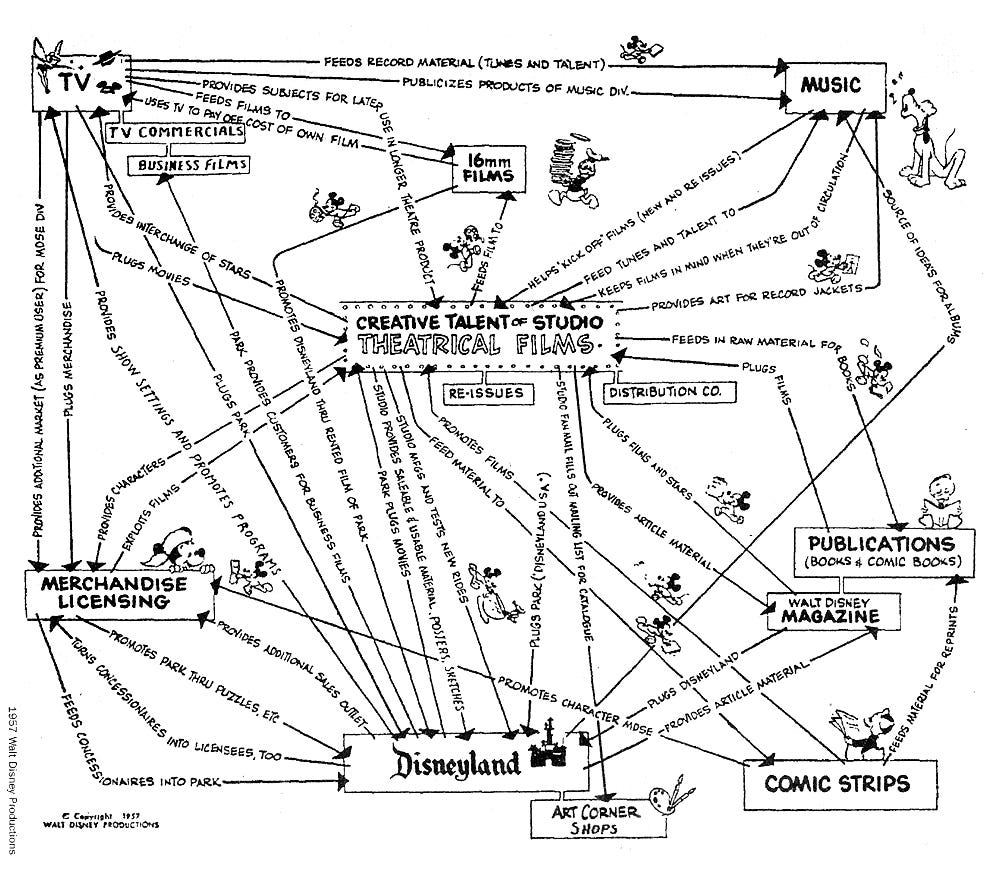A couple weeks ago,
proposed a thought exercise for the FilmStack community: What would you do if you ran a film studio? It was a great prompt that got lots of amazing responses — innovative ideas and desperately needed perspectives for an industry that is stuck in the mud.I didn't post a response because (a) I was slammed with other work, and (b) much of my energy these days is directed at finding improvements to the film industry on a much smaller scale — I advise individual filmmakers and develop individual projects, thinking critically about how to reach the largest audience for each one. I would imagine most FilmStackers are in a similar boat: Not currently, or likely ever to be, in a position to advise or influence the direction of major film studio. So we can dream big and offer our high-level, industry-fixing solutions, but there’s literally a show on Apple+ right now to scratch that escapist itch.
So, I’ll propose a similar, yet slightly more tangible writing prompt: What will you do with your next great IDEA?
Too often, a good idea is created within constraints that force it down a particular development path. In documentary, it might be a time constraint on the story or access to a storyteller. Perhaps the filmmaker is beholden to the schedule of a subject, or the timing or location of an event. And in the scripted space, development is often tied inextricably to the screenplay: If the end goal is to make a feature film, then every conversation with an agent, financier or director begins with “Do you have a script?”
So imagine a project without those conditions or constraints, where you could design an uninhibited creative development plan. Given the state of the industry, the world, and technology, how would you approach it? Would you still write a script, try to get an agent, attach a director or actor, look for financing, then submit to film festivals and hope for a global streaming sale? I think I would try a different route:
1. Envision a storytelling universe
What's the most expansive version of your story? Or more simply: What is the core idea or concept you are conveying, and how many ways can you tell that story? Before diving into execution, take time to explore the full potential of your concept. Map out characters, worlds, themes, and possible storylines. Think about how your idea could expand beyond a single film into a broader universe that could sustain multiple stories. This applies equally to scripted and documentary storytelling.
Consider questions like: What's the backstory that doesn't fit in the main narrative? Are there secondary characters with compelling stories of their own? Could your concept work across different time periods or locations? The traditional film industry often reduces ideas to their most marketable singular form, but the real power might lie in the broader universe you're creating.
2. Get it out there
What's the simplest way to communicate it to an audience? I recently caught up with
, and after mentioning a scripted project I was working on in early development, he casually suggested I start a TikTok account for the fictional lead character, and see how audiences react to him. Incredible! Rather than waiting years for traditional production and distribution, I’d much rather consider how to introduce elements of my story to potential audiences immediately.This could mean writing a short story or novella and self-publishing, creating a podcast that explores the world, developing a simple game, starting a newsletter, or producing low-budget short-form content for social platforms. The goal isn't to give away your entire concept, but to start building interest and proving there's an audience for your idea.
3. Iterate
What is the audience telling me about this idea, and where can I take it that I never considered? One of the greatest advantages of modern storytelling is the ability to get immediate feedback and adapt. Pay close attention to which elements resonate most with your early audience.
Which characters do they connect with? What questions do they ask about your world? What theories do they develop about where the story might go? This feedback loop can lead to unexpected and exciting directions you might never have considered on your own. The traditional development process often happens in isolation, but audience engagement can help your idea evolve in organic, authentic ways.
4. Find partners
Illustrators, musicians, writers, podcasters…brands – why limit yourself to traditional film collaborators as the story takes shape? Look for creative partners with aligned audiences and build your world by incorporating their mediums.
A musician might create a soundtrack that helps establish your world's tone. A visual artist could develop concept art that brings your characters to life. A writer with an established audience might help co-develop a storyline. These partnerships can expand your reach while enriching your storytelling universe in unexpected ways. Cross-pollination between different creative fields can yield innovations that wouldn't emerge within traditional film development silos.
5. Keep Going
What happens after the film, where can the story go? This is where we come full circle: When you imaged the full storytelling universe from the outset, you likely missed the places it would go. So if there is a desire to keep exploring a world, I would follow it with eyes wide open to the different forms the story may take.
Your ultimate destination might not be what you initially imagined. The traditional path would suggest that your screenplay becomes a film, which might spawn sequels if successful. But in reality, your idea might give birth to an immersive experience, a series of novels, a podcast universe, or something that doesn't even exist yet. Stay open to following the energy of your audience and the natural evolution of your concept.
Your Turn
What I’m describing may sound familiar — it’s effectively the way Walt Disney viewed Mickey Mouse.
This took Walt a century to build. It’s taken Jimmy Donaldson about ten. Again, that’s not to say filmmakers are the same as content creators. But it is a restatement of the fact that filmmakers have access to all the same tools as content creators, so there is no reason not to take advantage of them.
If you developed a great idea, would you follow a similar path? Building out a story universe, maximizing the storytelling avenues? Or is the traditional fundraising and distribution path your preference? How would you do it differently from the rest of us battling a terminally dysfunctional entertainment ecosystem?
The traditional path isn't necessarily wrong – it's just one option among many. And for most creators, it might not be the best one anymore.






Loved this one, Sam. We're quite aligned.
Reading it, I was like "he's talking about the same stuff I'm going to be talking about in my next post!"
I promise I'm not plagiarizing 😅